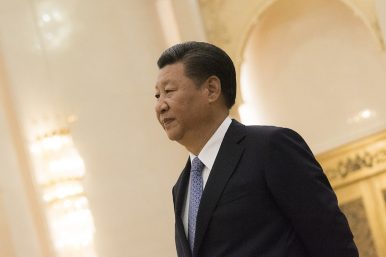By Robert Farley
So how does China fight back against the U.S. trade offensive on the IP front?
 In my last column, I argued that it is becoming increasingly clear that the foundations of the trade disputes between the United States and China extend beyond intellectual property. With a distinctly zero-sum approach to U.S.-China economic relations and a “might makes right” approach to international trade, characterized by U.S. trade representative Robert Lighthizer, the very fact of China’s economic heft seems like a more important factor than any specific IP policies.
In my last column, I argued that it is becoming increasingly clear that the foundations of the trade disputes between the United States and China extend beyond intellectual property. With a distinctly zero-sum approach to U.S.-China economic relations and a “might makes right” approach to international trade, characterized by U.S. trade representative Robert Lighthizer, the very fact of China’s economic heft seems like a more important factor than any specific IP policies.
This should make us wonder if intellectual property violation is not, in some sense, the WMD of the U.S.-China trade war. To be clear, the Trump administration has determined that national security considerations, which for nearly 70 years tilted in favor of constructing a robust system of international trade (and deriving the benefits of that trade), now militate against such a system. The liberal international trading order, as it were, cannot abide the emergence of the sort of economic threat to the United States that China now poses.
But this necessarily brings up question of hard and soft power. The national security strategy goes very far indeed with respect to U.S. domestic law, and U.S. domestic audiences. It performs rather less well with the international audience; Europe already seems lukewarm on the idea of going to the trenches against China on IP and technology. U.S. efforts to strongarm Germany into compliance regarding Huawei suggest that there are limits to European enthusiasm, even as European firms have found themselves subjected to Chinese espionage.
Beijing can probably develop a favorable narrative in this conflict. As analysts of Chinese behavior point out with some regularity, the United States pursued aggressive strategies of intellectual property appropriation in the 19th century. The international IP regime that China is expected to comply with did not fully come into form until the 1990s, suggesting that China’s current behavior is not some kind of world-historic deviation from global norms. And as Chinese technology becomes more competitive internationally (a process that has already taken place in the copyright field, for example), China will exert increasingly robust efforts to protect IP. Indeed, as the recent Qualcomm decision suggests, this regulatory system offers China its own set of weapons in the trade war against the United States. Of course, the effectiveness of this weapon depends on perceptions of the fairness of the Chinese regime; this is a lesson that the United States should also heed.
While U.S. allies seem to care quite a lot about whether China steals their technology, they may care somewhat less about the strategic competition between Washington and Beijing. In particular, while the United States appears willing to make significant sacrifices in order to cut into Chinese economic growth, it is hardly obvious that France or Germany are willing to make sacrifices on the same order. In the long run, the United States needs to think very hard about what it is willing to pay in order to undercut Chinese economic growth.
Again, the WMD analogy has some value. WMD offered advocates of war with Iraq a rhetorical focus, just as IP has offered a focus in the trade war against China. But the failure to find WMD proved catastrophic for America’s world standing. Unlike Iraqi WMD, Chinese IP violations are hardly imaginary. But the United States may find it increasingly difficult to hold together an IP-focused coalition if it becomes clear that intellectual property is only an excuse for conflict. And Beijing may be able to craft a narrative that depicts it as the victim of U.S. abuse, rather than as the facilitator of an organized criminal conspiracy.
The views expressed here are his personal views and do not necessarily reflect those of the Department of Defense, the U.S. Army, the Army War College, or any other department or agency of the U.S. government.
No comments:
Post a Comment